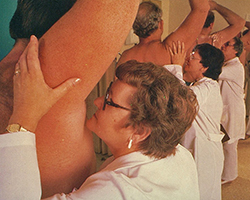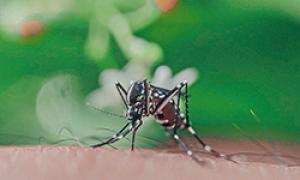Why Do Mosquitoes Bite Me?
You were only outside for 5 minutes, and you carefully waved away any mosquitoes you saw. But somehow, they still got you. You have two itchy bites on the backs of your legs. Mosquitoes seem to find you every time you go outside!
If you are like most people, you have probably wondered why some people get bitten by mosquitoes more than others. Mosquitoes are attracted to carbon dioxide (CO2), which you breathe out, and to your body heat. However, all people (and animals) breathe out CO2 and produce body heat. Still, some people attract more mosquitoes than others.
Possible explanations have ranged from a person’s blood type to how much garlic a person eats. But recent research is showing that one thing seems to be the biggest mosquito attraction - smell. That’s right, mosquitoes smell you to decide if they like you. They mostly focus on your skin odor.
What Attracts Mosquitoes?
Female mosquitoes are attracted to blood sources, which they need for developing their eggs. Females find a blood meal by using sensory cues. The big sensory cues for females include carbon dioxide (CO2) from exhaled air, skin odor, and body heat.
CO2 is the first clue mosquitoes often notice that lets them know a human or animal might be near. CO2 can be detected from far away and female mosquitoes will follow the CO2 to try to find the source. Once a human or other animal source has been located, the female mosquito will smell the animal’s odor.

Skin odor from humans and other animals is not the same. Some mosquitoes prefer humans and use smell to guide them to the host they prefer. However, if a mosquito prefers humans, this does not mean all people are equally likely to get bit. The likelihood that a person will be bitten is related to their smell.
After a female mosquito detects CO2 and smells her preferred host, she then will use body heat. Body heat helps her to hone in on her target and ensure she finds her blood meal.
"Why Do Mosquitoes Love Me?"
Have you heard someone say that mosquitoes like you because you have ‘sweet blood’? This is a myth. But, the specific chemicals of how you smell are at play. Human smell, or skin odor, is made up of several chemicals. Mosquitoes love the one called lactic acid. This is produced by bacteria on our skin when we sweat. That means that smelling like sweat makes a person more of a mosquito magnet.

Certain activities such as exercise or drinking alcohol can increase the amount a person sweats. This will increase the person’s chances of getting bitten. But, you can decrease your smell by showering or bathing. This washes bacteria off of your skin that can react with your sweat, which reduces your smell.
Other possible factors such as blood type and garlic in your diet may play a role, but whether or not these actually attract mosquitoes is still unclear. Of the three main attractants (CO2, skin odor, and body heat), all are related to normal body function. You can reduce your skin odor, but you cannot prevent it entirely. However, one of the best ways to ensure you don’t get bit by mosquitoes is to cover exposed skin with loose and thick clothing. Another way is to use repellents and/or protective barriers, such as a bed net, when possible.
Read more about: All About Mosquitoes
Bibliographic details:
- Article: Why Do Mosquitoes Like Me?
- Author(s): Dr. Biology
- Publisher: Arizona State University School of Life Sciences Ask A Biologist
- Site name: ASU - Ask A Biologist
- Date published: 29 Aug, 2023
- Date accessed:
- Link: https://askabiologist.asu.edu/mosquito-magnet
APA Style
Dr. Biology. (Tue, 08/29/2023 - 09:53). Why Do Mosquitoes Like Me?. ASU - Ask A Biologist. Retrieved from https://askabiologist.asu.edu/mosquito-magnet
Chicago Manual of Style
Dr. Biology. "Why Do Mosquitoes Like Me?". ASU - Ask A Biologist. 29 Aug 2023. https://askabiologist.asu.edu/mosquito-magnet
Dr. Biology. "Why Do Mosquitoes Like Me?". ASU - Ask A Biologist. 29 Aug 2023. ASU - Ask A Biologist, Web. https://askabiologist.asu.edu/mosquito-magnet
MLA 2017 Style

Human blood is the favorite food of female Aedes aegypti. This means they are “anthrophilic,” or people loving. It also makes them even more likely to transmit yellow fever, dengue, Zika, and chikungunya. Because of this, these mosquitoes can pose a huge threat to public health and safety.
Be Part of
Ask A Biologist
By volunteering, or simply sending us feedback on the site. Scientists, teachers, writers, illustrators, and translators are all important to the program. If you are interested in helping with the website we have a Volunteers page to get the process started.



